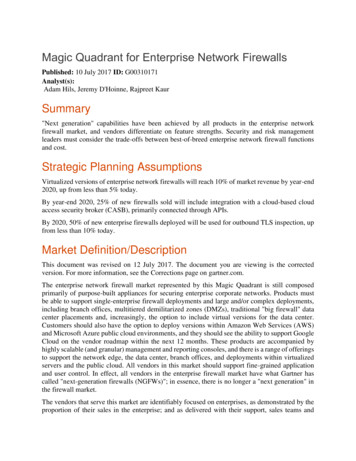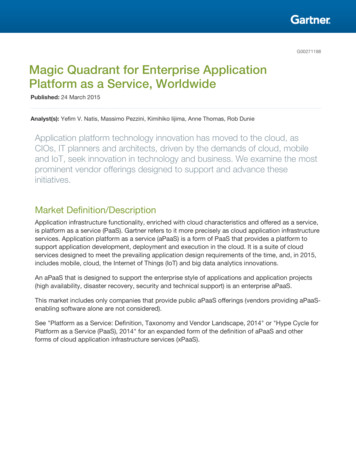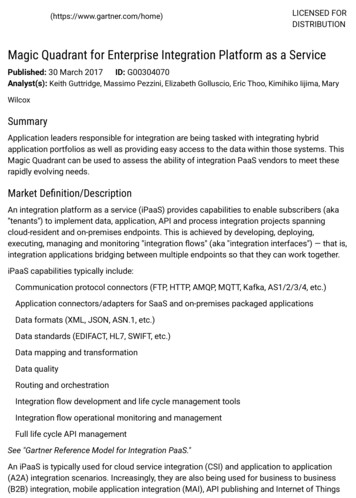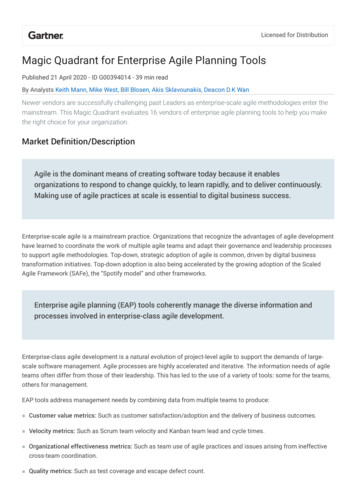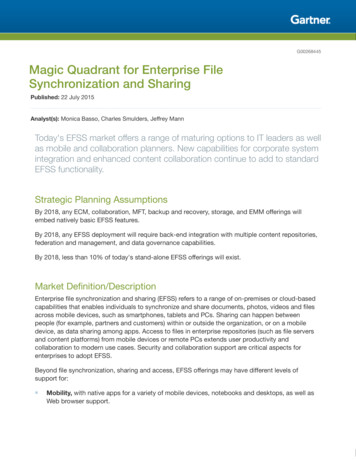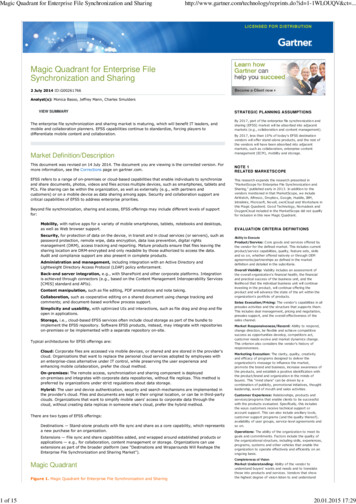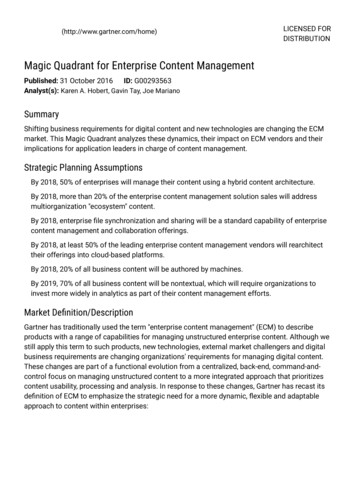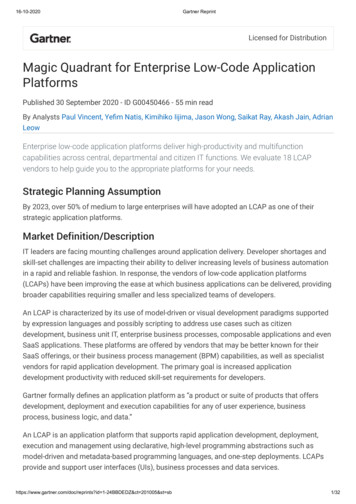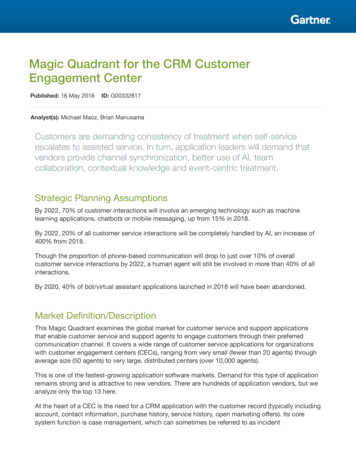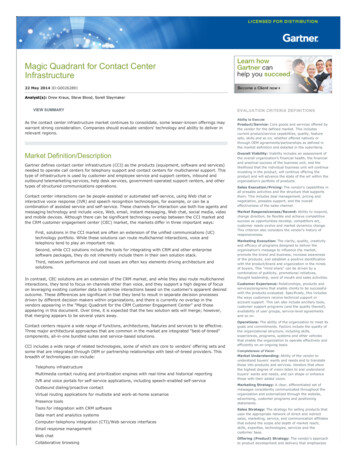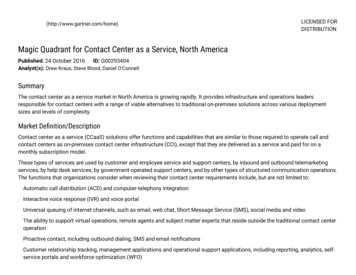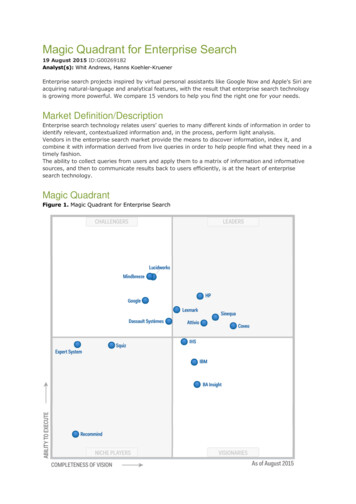
Transcription
Magic Quadrant for Enterprise Search19 August 2015 ID:G00269182Analyst(s): Whit Andrews, Hanns Koehler KruenerEnterprise search projects inspired by virtual personal assistants like Google Now and Apple's Siri areacquiring natural language and analytical features, with the result that enterprise search technologyis growing more powerful. We compare 15 vendors to help you find the right one for your needs.Market Definition/DescriptionEnterprise search technology relates users' queries to many different kinds of information in order toidentify relevant, contextualized information and, in the process, perform light analysis.Vendors in the enterprise search market provide the means to discover information, index it, andcombine it with information derived from live queries in order to help people find what they need in atimely fashion.The ability to collect queries from users and apply them to a matrix of information and informativesources, and then to communicate results back to users efficiently, is at the heart of enterprisesearch technology.Magic QuadrantFigure 1. Magic Quadrant for Enterprise Search
Vendor Strengths and CautionsAttivioAttivio is based in Newton, Massachusetts, U.S. It sells its Active Intelligence Engine (AIE) as aplatform with a broad foundation for application development. It concentrates on high value andstrategic search deployments that use both its analytics engine and its core search products.Strengths Attivio offers its platform on an unusually broad set of cloud services, including those ofAmazon, Microsoft (Azure) and Salesforce (Force.com). Organizations that use Attivio can expect their natural language queries to be parsed todiscover relationships in the expressed syntax. Attivio's engine can translate that syntax intointerpretation of relationships within a content corpus. Attivio's analysis of results reveals patterns in unstructured content.Cautions Attivio's federation depends on simple passing of queries to external search engines, withoutsignificant analysis or comparison of results. It does, however, offer what it calls "Query TimeJoin," which combines results in a similar manner. Attivio's interface to enable administrators to improve results and manage the applicationsdeveloped on its platform remains challenging to use, although it has improved significantly. Attivio targets very high value, broad spectrum platform installations, and prospectivecustomers report that its prices are significantly higher than those of competing vendors.BA InsightBA Insight is based in Boston, Massachusetts, U.S. Its software portfolio includes a stand alonesearch application, a search application that runs on Microsoft's SharePoint platform, and connectorsand classification capabilities.Strengths Organizations with significant investments in SharePoint in particular can derive value fromBA Insight's strong support for this Microsoft platform. They indicate that, among otheradvantages, they can index Office 365 content via connectors to on premises SharePointinstances. Projects that use BA Insight's software can improve the relevancy of search results viaparticularly rich analysis of implicit user behavior in search practices. Social functionality forsaving and sharing results and search insights is also extremely strong. BA Insight provides very useful tools to enable administrators to see why particular resultsare offered for any search.Cautions BA Insight offers users only limited insight into the logic used to determine its selection ofresults. End users have limited options for understanding how results are selected for individualqueries. Services or customizations are necessary to render results in syntactically correct languagefor natural language question answering.CoveoCoveo is based in Quebec, Canada. It sells the Coveo Intelligent Search Platform. It pursues mostlylarge installations with significant seat counts and installations that are likely to amass large seatcounts.Strengths Coveo offers unusually rich security functions. These support various authentication modelsand enable complex privilege systems to be preserved in search results. Reference customersindicate that they chose Coveo for such capabilities. Coveo's autosuggest options enable organizations to derive automatic suggestions from thesearch index, from dictionaries and from manual additions. The autosuggest interface alsoallows users to see what repositories the queries will lead to before selection. Coveo's analysis of results reveals patterns in unstructured content.
Cautions Coveo does not offer rich analysis of natural language queries or offer answers in naturalsyntax. Coveo's social functionality in the Coveo Intelligent Search Platform depends on tags withinits own application and logic, which is an effective but less intuitive approach than that usedin competing vendors' applications. Coveo mostly targets installations intended to serve large pools of users (a typical installationhas more than 100 seats), which makes it less attractive for small user groups, such ascollaborative and discrete teams of engineers.Dassault SystèmesDassault Systèmes (3DS) is based in Paris, France and Boston, Massachusetts, U.S. It sells theExalead search product under the names Exalead OnePart, Exalead OneCall and Exalead CloudView.These are linked to three main focus areas: digital assets, customer interaction, and machine dataand analytics.Strengths 3DS's search platform, which is delivered as SaaS, is fully featured and has been in placelonger than similar platforms from other vendors. Exalead's analysis of results reveals patterns in unstructured content. Exalead's autosuggest options enable organizations to derive automatic suggestions from thesearch index, from dictionaries and from manual additions. Entities that Exalead has locatedin content also surface in autosuggest.Cautions 3DS increasingly focuses its offering on applications designed to address the needs ofmanufacturers and to support engineers. Prospective customers in different industries or withdifferent needs will find it less attractive. Federation of queries is achieved in a nontraditional way, although Exalead can be used to"mash up" results with data from other sources to present rich results effectively. 3DS does not offer rich choices for analyzing search behavior with a view to personalizingresults.Expert SystemExpert System is based in Modena, Italy. It sells the Cogito semantic technology platform as variousdifferent packaged products for specific use cases relevant to industries such as banking, lifesciences, oil and gas, and government.Strengths Expert System supported natural language queries long before they became commonplace inconsumer applications and an element of enterprise search applications. Its offering isexceptional in this regard. Searchers have more options for understanding why given result sets are selected andpresented than with other vendors. Metadata elements and relevancy logic are exposedintuitively. Reference customers indicate that Expert System is unusually attentive to their needs,providing strong service, necessary functionality and a genuine understanding of theirapplication needs.Cautions Expert System's offering runs as a cloud application on comparatively few cloud platforms. Analyzing search result sets for an aggregated view or for pattern discovery is difficult. Autosuggestion for query completion is limited.GoogleGoogle is based in Mountain View, California, U.S. It sells the Google Search Appliance as a standalone system that includes both software and hardware.Strengths The Google Search Appliance is easy to install and configure, and requires comparatively littleconfiguration, tuning or maintenance. The Google Search Appliance's autosuggestion capabilities draw on the market leading abilityof the google.com consumer product, which enables it to deliver an unusually rich end userexperience.
Google has improved the depth of its features for administrators, to make it easier for themto tune the relevancy of search results.Cautions Federation capabilities are superficial and do not allow for interleaving of search results. It is difficult to analyze search results as sets, so as to develop an analytical view of data. Although the Google Search Appliance benefits from lessons Google learned from its flagship,consumer facing google.com, it still lags behind google.com in terms of natural languageanswering. Also, it offers no graph search capability. HPHP is based in Palo Alto, California, U.S. It sells the HP Intelligent Data Operating Layer (IDOL)engine as part of its HP Big Data Software business unit. The IDOL engine has been combined withHP Vertica products to provide search and analysis across structured and unstructured information.Strengths HP now offers the IDOL engine in a lighter weight, developer targeted cloud edition in aneffort to attract business from smaller projects that previously could not expect to succeedwith the full IDOL platform. Security options are extremely flexible — HP's customers often care more about security thanthose of other vendors. HP's reference customers confirm that security is a particularstrength. The IDOL engine's analysis of results reveals patterns in unstructured content.Cautions HP does not offer rich analysis of natural language queries. Nor does it offer answers innatural syntax. HP exposes only limited information to users about why result sets or individual results arereturned. Although HP is improving administrators' access to its rich feature set, reference customersstill express concerns about the product's complexity and ease of use.IBM IBM is based in Armonk, New York, U.S. It sells IBM Watson Explorer. It intends this to be usedespecially for content analytics and big data applications, as well as general purpose enterprisesearch.StrengthsIBM has very strong analytical capabilities for both content results and structured data.IBM can draw on many adjacent technologies in the Watson portfolio to add excellent question andanswering capabilities to its search product.Clients often choose IBM for its rich and flexible implementation of security within search.CautionsClients need to evaluate whether IBM's roadmap for Watson and associated products suits theirfuture needs and expectations.IBM's means of showing administrators how particular search results were arrived at are less intuitivethan those of other vendors.Some products in the IBM Watson family, especially those that offer full smart machine capabilities,require significant resources in terms of consulting and customization.IHSIHS is based in Englewood, Colorado, U.S. It sells the IHS Goldfire search engine, mostly toengineering and technical domains, for which it combines its search technology with its engineeringinsight and information solutions.Strengths IHS's very effective graph search capability uses relationships between entities — evenacross data sources — to provide insights to users. Goldfire enables users to pose questions in natural, semantically intact wording and inmultiple languages. Goldfire provides results in natural, semantically intact language, enabling intuitiveunderstanding of concepts within, and insights from, the searched materials.
Cautions Goldfire has limited social functionality for sharing results and for discovery. Autosuggestion is limited to terms from dictionaries, concepts that Goldfire has identifiedpreviously, and users' prior queries. It is not obvious to users why particular results are presented in response to individualqueries.LexmarkEarly in 2015, Perceptive Software was renamed Lexmark Enterprise Software, a division of Lexmark.It is based in Lenexa, Kansas, U.S. It sells Perceptive Enterprise Search as its main enterprise searchsolution.Strengths Lexmark has an extremely transparent and effective pricing model. Lexmark is well able to provide both cloud and hybrid search capabilities. Clients praise Lexmark's strong focus on security.Cautions It is difficult to tune relevancy on the basis of user behavior. Perceptive Enterprise Search has no graph search capability. Out of the box, Perceptive Enterprise Search offers only limited support for social sharing.LucidworksLucidworks is based in San Francisco, California, U.S. It sells Lucidworks Fusion as either a standalone search platform or an add on to an existing Apache Solr installation. Lucidworks draws on theLucene/Solr open source Apache project, to which it contributes regularly.Strengths Lucidworks takes a very strong hybrid approach that enables cloud resident capacity tohandle searches during peak traffic periods. Lucidworks offers a broad range of features for tweaking, tuning and developing searchapplications. Lucidworks essentially offers an open source derived product, and which it sells clearly andsimply using a processor based model for enterprises.Cautions Lucidworks does not offer rich analysis of natural language queries or offer answers in naturalsyntax, though it intends to in future. Lucidworks offers no federation capabilities. Users have only a limited number of ways to evaluate and understand why search results areselected. Administrators' ability to examine results is limited to an explanatory model that isnot visually intuitive.MindbreezeMindbreeze is based in Linz, Austria. It sells the Mindbreeze InSpire search engine as a searchappliance box, which includes both hardware and software. It focuses strongly on a combination ofstructured and unstructured search.Strengths Mindbreeze makes excellent use of its search capabilities to promote application use casesbeyond ordinary enterprise search, such as autoclassification during the capture process andindustry use cases, such as ones for the healthcare sector. Mindbreeze offers strong mobile app capabilities across a wide range of devices, includingAndroid and iOS tablets and phones. Mindbreeze offers many natively developed connectors, which enables indexing of a widerange of data sources. It also offers strong federation capabilities.Cautions It is difficult to tune relevancy on the basis of user behavior. Mindbreeze has limited visibility outside Europe, and only a small (but improving) network ofpartners. Since Mindbreeze's pricing is based on the number of documents indexed, clients need tomonitor how many repositories and documents they index.
RecommindRecommind is based in San Francisco, California, U.S. It sells the Decisiv Search engine mainly to lawfirms and professional services firms, on which it focuses much of its attention and marketing.Strengths Recommind's customers report that its search engine has an intuitive user interface and iseasy to install. In previous years, Recommind had faced concerns about the professionalresources required to install and manage its product, so this change is welcome andauspicious. Text within documents can trigger security groupings, an unusual feature that suits some usecases and that almost no other vendors offer. Recommind is extremely well known in the legal market and has skills that it can easilyextend to its other target market of professional services.Cautions Recommind does not actively market its product outside its key target industries. Although Recommind highlights its statistical analysis capabilities' provision of some naturallanguage insight, it does not pursue natural language question answering or other naturallanguage responses to the degree that other vendors do. Recommind offers only limited social functionality for sharing results.SinequaSinequa is based in Paris, France, but reports that it generates almost half its new sales revenue inthe U.S., and it is expanding its North American presence. It sells Sinequa ES, which combines searchand analytics capabilities, for assorted use cases including, but not limited to, enterprise search.Strengths Sinequa has strong analytical capabilities. Its product can analyze data before searches areconducted. It can also analyze and visualize search results. Sinequa offers the ability to tune the relevancy of results, based directly on user feedback,aided by a feedback loop to administrators. Sinequa has strong features in relation to administrator or end user driven relevancychanges, which enable more relevant documents to be pushed to the top of search results.Cautions Sinequa offers only very basic capabilities when federating searches. No interleaving isavailable. It relies on administrators to tune relevancy. Sinequa focuses strongly on analytics driven by search, which may limit its appeal to a wideraudience looking for solutions for tactical, rather than strategic, search projects. Sinequa's pricing is more difficult for organizations to interpret than is the case for othervendors with simpler products.SquizSquiz is based in Sydney, Australia. It sells Squiz Funnelback as both a stand alone product and partof its CRM and content management system products, which are its main focus.Strengths Squiz provides very useful tools to enable administrators to see why particular results arereturned for a given search. Funnelback's autosuggest capability enables the discovery of prominent document metadata,such as titles, or preselected terms or result pages that administrators have developed. Funnelback provides flexible security, including models that work across indexing and resulttime frames, and that allow for mirroring of particularly complex privilege models.Cautions Squiz has only recently entered the U.S. market with significant investment. Funnelback offers only limited social functionality for sharing results. Capabilities for analyzing results with Funnelback remain limited.
Vendors Added and DroppedWe review and adjust our inclusion criteria for Magic Quadrants and MarketScopes as marketschange. As a result of these adjustments, the mix of vendors in any Magic Quadrant or MarketScopemay change over time. A vendor's appearance in a Magic Quadrant or MarketScope one year and notthe next does not necessarily indicate that we have changed our opinion of that vendor. It may be areflection of a change in the market and, therefore, changed evaluation criteria, or of a change offocus by that vendor.Added SquizDropped exorbyteCustomerMatrix (PolySpot)MarkLogicInclusion and Exclusion CriteriaTo be included in this Magic Quadrant, we required that each vendor: Offer a product marketed as a "search engine" or an "enterprise search" product that alsomet Gartner's definition of enterprise search. Offer a search product or products that is/are available separately from all its other products(such as portal, infrastructure, content and records management, e discovery and CRMproducts). Have generated more than 6 million in revenue from enterprise search products in 2014. Identify at least three reference customers who acquired their enterprise search product in2014.Evaluation CriteriaAbility to ExecuteThe most significant factor determining a vendor's Ability to Execute is its product's maturity in termsof the capabilities that organizations associate with enterprise search requirements. These capabilitiesinclude security, social functionality suitable for enterprises, delivery architecture (cloud or onpremises), and federation and customization of results. Other contributing factors are the vendor'sfinancial viability, the attractiveness of its pricing model, the customer experience it offers, the extentand depth of its geographic coverage, and its ability to sell to, and support, customers internationally.Evaluation CriteriaWeightingProduct or ServiceHighOverall ViabilityMediumSales Execution/PricingMediumMarket Responsiveness/RecordNot RatedMarketing ExecutionNot RatedCustomer ExperienceHighOperationsLowTable 1. Ability to Execute Evaluation CriteriaSource: Gartner (August 2015)Completeness of VisionWe consider a vendor's abili
Magic Quadrant for Enterprise Search 19 August 2015 ID:G00269182 Analyst(s): Whit Andrews, Hanns Koehler Kruener Enterprise search projects inspired by virtual personal assistants like Google Now and Apple's Siri are acquiring natural language and analytical features, with the result that enterprise search technology is growing more powerful.
